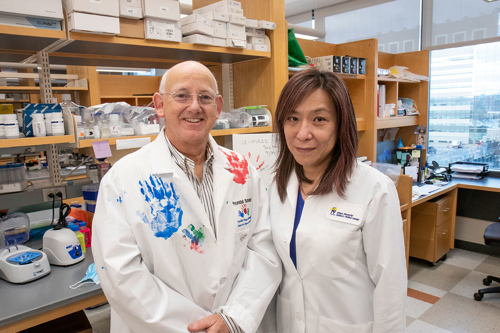Finding more effective treatments for a deadly childhood cancer
Date Posted: Wednesday, October 05, 2022
An aggressive and devastating childhood cancer, neuroblastoma is a major challenge in pediatric oncology. UMass Chan Medical School’s Jason Shohet, MD, PhD, is tackling the disease head on through a new, two-year $300,000 Scholar Hope Grant from Hyundai Hope On Wheels. Specifically, Dr. Shohet is focused on developing more effective and less toxic treatments for the deadly cancer.
Hyundai selected Dr. Shohet, the Ali and John Pierce Chair of Pediatric Hematology/Oncology, associate professor of pediatrics and chief of the Division of Pediatric Hematology and Oncology, after a highly competitive scientific review process. Dr. Shohet also received a 2019 Hyundai Hope On Wheels grant for neuroblastoma research, collaborating with Joae Qiong Wu, PhD, assistant professor of pediatrics.
For children and families, a neuroblastoma diagnosis means facing the unthinkable. Despite intensive treatments such as surgery, chemotherapy, radiation therapy and bone marrow transplantation, only about half of children with metastatic neuroblastoma survive. Primarily striking infants and children under age five, the cancer typically presents in the adrenal glands, which are on top of the kidneys, and can spread to the liver and bone marrow, and occasionally, the lungs.
“Our current chemotherapy-based treatment is hard on these young children and most children suffer significant ‘late effects’ of chemotherapy such as hearing damage, growth delays and liver damage. Our patients also incur an increased risk for secondary cancers from exposure to chemotherapy, so discovering new, less toxic treatments that cure more children is what our laboratory focuses on,” said Dr. Shohet.
For the 2019 Hyundai Hope On Wheels grant, the research team studied the role the enzyme protein methyltransferase 5 (PRMT5) plays in neuroblastoma. The team found that PRMT5 promotes tumor growth in preclinical models of neuroblastoma. Importantly, drugs targeting PRMT5, currently in clinical trials for other types of cancer, dramatically inhibited tumor growth and tumor metastasis.
Through the new grant, the research team is exploring the best way to combine PRMT5 targeting with established treatments. Dr. Shohet said that relapsed neuroblastoma is the primary cause of death in children with the disease.
“What happens when you treat neuroblastoma patients with chemotherapy alone is they have an initial response, but about half of cases become drug resistant,” Dr. Shohet said. Building upon the findings that resulted from his collaboration with Dr. Wu, Dr. Shohet hopes to sensitize neuroblastoma to chemotherapy and prevent the escape of drug-resistant tumor cells.
Originating in 1998 by a group of New England-area dealers and soon expanding into a nationwide initiative, Hyundai Hope On Wheels recently surpassed $200 million in lifetime donations to pediatric cancer research in the United States. Hyundai Motor America and its more than 820 U.S. dealers provides primary funding for this substantial corporate social responsibility effort. UMass Chan researchers have received $1.7 million from Hyundai Hope On Wheels since 2011.
Thanks to the continued partnership with Hyundai Hope On Wheels, Dr. Shohet and his team are making meaningful progress on neuroblastoma—and bringing hope to children and families confronting this life-threatening illness.
